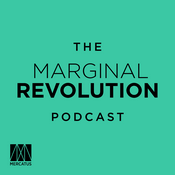Can America afford $30 trillion in debt—or is the real question whether it wants to?
In the final episode of Season 2, Alex and Tyler take on the growing mountain of federal debt—now equal to 100% of GDP, with interest payments alone rivaling national defense spending. Alex lays out the case for concern: rising obligations, off-balance-sheet liabilities for Social Security and Medicare, and a political system with no appetite for hard choices. Tyler pushes back, arguing that markets remain calm, real borrowing costs are near zero, and America's wealth-to-debt ratio tells a far less alarming story. From the relevance of the R versus G framework to the lessons of Japan's sovereign wealth strategy, they debate whether the real risk is insolvency or illiquidity, and whether solutions will come through growth, inflation, financial repression, or some mix of all three. Along the way, they explore how AI could reshape the fiscal picture—raising welfare more than wealth, extending lifespans while straining budgets, and changing what kinds of income governments can actually tax.
Transcript: https://www.mercatus.org/marginal-revolution-podcast/americas-debt-crisis-or-calm
Follow Alex, Tyler, and Mercatus
https://x.com/ATabarrok
https://x.com/tylercowen
https://x.com/mercatus
https://marginalrevolution.com/
https://www.mercatus.org/
Timestamps
00:00:00 - Should We Be Worried About the US Debt?
00:08:19 - R vs. G? It's the Political Economy, Stupid
00:16:52 - The Five Ways Out
00:22:21 - AI's Fiscal Paradox
00:30:44 - The Hidden Sovereign Wealth Fund
00:34:56 - The Bottom Line



